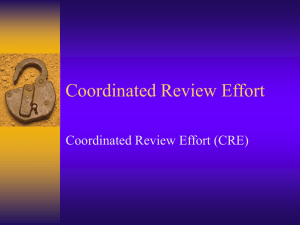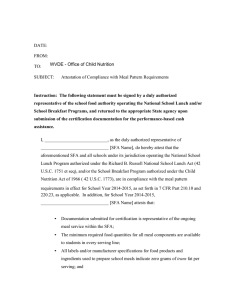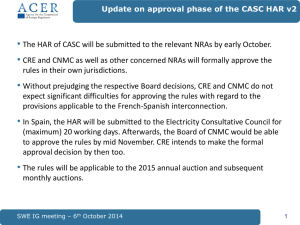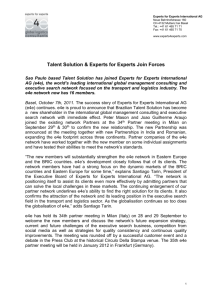C R E OORDINATED
advertisement
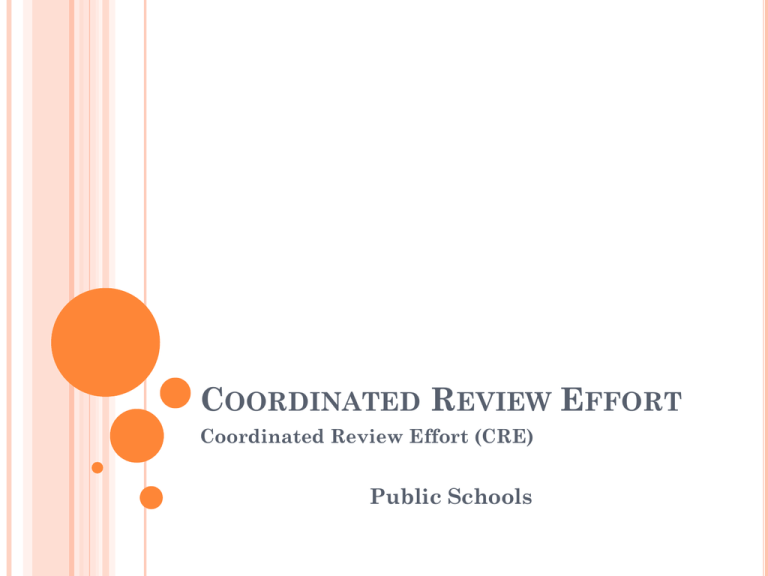
COORDINATED REVIEW EFFORT Coordinated Review Effort (CRE) Public Schools COORDINATED REVIEW EFFORT A federally mandated accountability review of the National School Lunch Program Conducted every 5 years in public schools, private schools and residential child care institutions A standard review form is used CRE COMPONENTS Coordinated Review Effort (CRE) is a two part process which includes critical and general areas. A WVDE state agency addendum is added to the general areas of review. The SFA and a designated number of schools are reviewed. CRE REVIEW School selection based upon criteria stated in federal regulations Selected from October claim (due by November 10th) Schools will be announced the morning of the entrance conference. At least two schools will be reviewed on Day 1 while the LEA prepares applications for Day 2. Superintendent and food service director notified of review details about 4 weeks prior to the review OVERVIEW OF CRE PROCESS Entrance conference School Food Authority (SFA) review School level reviews Exit conference Report to Superintendent, School Board President and Food Service Director SFA AND SCHOOL REVIEWS Critical areas General areas State addendum CRITICAL AREAS OF NON-COMPLIANCE Eligibility: free & red. price application Accurate counting and claiming Direct Certification Benefit Issuance Updating eligibility Day of review and review period Meal pattern compliance Day of review and review period NON-COMPLIANCE IN CRITICAL AREAS Requires corrective action by SFA (system -wide) Requires recovery of funds When fiscal action for the initial review and follow-up review(s) does not exceed $600.00, regulations allow a waiver May warrant a follow-up review Sponsor has the right to appeal any recovery of funds resulting from a CRE review FOLLOW-UP CRE: Free and Reduced Price Meal Applications 5% or greater error rate Counting and Claiming system as implemented does not yield accurate count (day of review and review period) Meal Pattern non-reimbursable meals claimed for reimbursement and/or the required food items not available to all students (review day and review period) SFA: GENERAL AREAS System for consolidating the claim Monitoring responsibilities Reporting and record keeping Civil Rights Benefit issuance Verification SFA: STATE ADDENDUM Internal accounting Billing and collections Audit compliance Systems management Annual Report Procurement Inventories Staffing Policies (including Wellness Policy) SCHOOL: GENERAL AREAS Free and reduced price process Policy statement implemented as approved System Prevent overt identification Verification completed according to Regulations Letters of potential reduction in benefits sent to households as required SCHOOL: GENERAL AREAS Meal Patterns Portion sizes meet the meal pattern Variety low-fat/Non-fat fluid milk available Offer vs. serve implemented correctly Bread/grains servings meet requirements Servings of fruits & vegetables meet requirements SCHOOL: GENERAL AREAS Reporting and record keeping: records maintained for 3 years + year of operation Civil rights: poster, non-discrimination statement included on program materials, i.e., school handbooks, menus Special dietary needs SCHOOL: STATE ADDENDUM Point of Service Does system identify non-reimbursable meals. 2nd meals served to students Meals served to program adults, non-program adults, teachers, visitors. Daily Summary Reports Maintained Meal service counts and cash collections SCHOOL: STATE ADDENDUM Cash management Receipts for cash received Reconciliation with bank statement Bank reconciliation reflect two signatures Dual signatures on checks Petty cash ( how documented/verified) Internal controls Proper segregation of duties Edit checks completed ( signed & dated) SCHOOL: STATE ADDENDUM Option B 1 bread/grains offered daily (7/11) 5 b/g servings contain 33% whole grain Offer 1cup / 1 ¼ cup fruits, vegetables daily Offer ¼c – ½c FRESH fruits/veg. 5 times/wk Offer ¼c - ½c dried beans, dried peas, or lentils weekly Limit sugar, fat, salt in food preparation SCHOOL: STATE ADDENDUM Competitive food sales Food safety/ HACCP Plans Production records CN labels, nutrition fact info, local recipes Drinking water available in dining area Adequate time for meal Dining area and admin. practices encourage participation Pregnant & lactating students A la carte sales (only fluid milk may be sold in dining area during breakfast/lunch periods) (federal regulation) School and community involvement in nutrition policies and practices GENERAL AREAS OF NON-COMPLIANCE Requires corrective action; however, noncompliance does not warrant a follow-up review or recovery of funds. COMMON CRE PROBLEMS Application, benefit issuance, and direct certification errors Verification problems – timeframe, status change, documentation, notify household of verification outcome Manual meal count input errors Daily summary reports not updated Receipting of cash collected daily Cash collected on line (potential for overt identification) Segregation of duties COMMON CRE PROBLEMS Monitoring – recommend using OCN form document follow-up visits Not enough time to eat Competitive food sales Minimal nutritional value Direct competition in cafeteria Non-compliance w/ Policy 4321.1 Non-reimbursable meals Inadequate monitoring of food bars Failure to document accurately COMMON CRE PROBLEMS School negotiated snack and beverage contracts SFA written response to corrective action timeframes (within 30 days of receipt of written CRE report) Five whole grain servings per week Current health department inspection (2) Collection of outstanding bill payments COMMON CRE PROBLEMS Complete/standardized local recipes Documenting CCPs and SOPs Maintaining temperature logs KEYS FOR A SUCCESSFUL REVIEW Train school staff so they know what to expect Be prepared: review this information and organize materials needed for the CRE (school and SFA checklists, review forms, etc.) Relax! WE’RE COUNTING ON YOU To serve the children of WV
